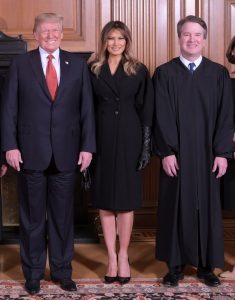From the Supreme Court to your local county courthouse, judges matter as they interpret the laws that affect you every day. Are you comfortable with a judiciary that merely echoes the will of any President?
In 2016, many on Team Blue agonized about whether they should bother to vote at all since obviously corporate-shill Hillary Clinton was exactly the same as Donald Trump in every important way. Meanwhile, on the other side of the aisle, many on Team Red had a clearer vision of why voting is important, even if their candidate made them throw up in their mouth a little. One reason? Judges matter. Supreme Court justices don’t live forever, and there was even a seat that Mitch McConnell had been holding open since Antonin Scalia died nine months prior. Trump promised to draw nominees from a who’s-who of Federalist Society darlings. It worked. Two years later, Justices Gorsuch and Kavanaugh topped up the new conservative-majority Court that will influence the interpretation of law for decades to come.
Let’s take a look at some of what the Court has been up to lately.
Imagine, if you can, that teenage boys sometimes do boneheaded things. (I know, it’s a stretch.) In 2010, fifteen-year-old Sergio Adrián Hernández-Güereca was playing a game with his friends, daring each other to run across a cement culvert on the U.S.-Mexico border, touch a fence on the U.S. side, and run back. A Border Patrol agent named Jesus Mesa, Jr., saw the boys’ game and, fearing for the national security of the United States, decided to shoot at the kids. He took aim at Hernández, putting two bullets in him, one in his face, killing the unarmed boy on video.
At the time, Mesa was standing on United States soil, but Hernández was across the border in Mexico. In Hernández v. Mesa, the Supreme Court decided 5-4 that the Hernández family had no standing, as foreign nationals, to bring suit under U.S. law. If the boy had died on the U.S. side, he’d have Constitutional rights and Mesa could be liable. The four liberal justices opined that it shouldn’t matter where Hernández was standing when he died, but the conservative majority decided that Border Patrol officers (and law enforcement generally) will make mistakes on the job, and it’s important to not tie their hands by punishing them too harshly when people seek redress for such violations. That’s one reason judges matter: they have some degree of control over how much of a police state we become.
The Supreme Court is also hearing arguments regarding just how much power the President should have over independent agencies, like the Consumer Financial Protection Bureau (CFPB). These governmental agencies are considered independent because they’re outside of the President’s direct control; he nominates their leaders, but they don’t report to him and while he can remove them, the law only allows removal for “inefficiency, neglect of duty, or malfeasance in office.” These words have typically been narrowly interpreted to cover obvious ineptitude or corruption, such as taking bribes.

In Seila Law v. Consumer Financial Protection Bureau, Seila Law, a California law firm (which was being investigated by the CFPB for violating federal consumer laws), is arguing that limiting the President’s ability to fire the head of the CFPB violates the President’s Constitutional rights. Despite a century of precedent, the Court’s conservative majority seems sympathetic to the notion that “independent agencies” shouldn’t be so independent, and that “neglect of duty” or “malfeasance in office” could also be more broadly interpreted as failing to adhere to the will of the President. Justice Kavanaugh, in particular, has already made his intentions clear with his dissent when the appeals court he sat on upheld the current structure of the bureau. Judges matter, because their interpretations of law have a direct bearing on the rights and protections we enjoy in our daily lives.
Judicial independence and the separation of powers are key protections insuring that the rights of Americans are protected. Unfortunately, President Trump has taken aim at the very concept that the judicial branch should hand down anything other than Trump brand justice. On numerous occasions, he attacked judges who decided cases against his interests, threatened to dismantle a court that halted his first travel ban, asserted that decisions made by Obama-appointed judges were not real, insisted that liberal justices recuse themselves from cases involving him or his policies, and even slammed a private citizen who served as forewoman on the jury that found his friend Roger Stone guilty of lying to Congress. All the while, the President has been stocking the judiciary at a historic rate, preferring ideology over experience, and with an emphasis on youth, so that these judges will affect policy long after the President is out of office. Trump knows that judges matter.
A really important decision is coming up this November. If you like the idea of unrestrained police and all three branches of government acting as the President’s lapdogs, your choice is clear. However, if these notions offend you, consider choosing someone to replace him at the next opportunity. Remember, you’re not just voting for a candidate who may or may not perfectly embody your policy wish list. You’re also voting for the person who will nominate judges and replacements throughout the court system. We can’t count on Stephen Breyer, who turns 82 this year, and Ruth Bader Ginsburg, a cancer survivor who will be 87 next week, to protect us forever. Judges matter, and as voters, your judgment matters the most of all.
Related: Why Should You Bother Voting?


Join the conversation!